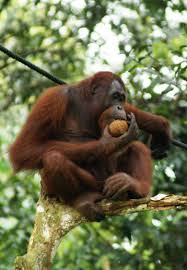orang-utan
[ɔ:,ræŋu:'tæn]
orang-utan 猩猩来自马来语orang utan,森林人,来自orang,人,utan,森林。其原义可能为森林野人,后被荷兰人误以为是森林里面的猩猩。
- orang-utan
- orang-utan: [17] Malay ōrang ūtan means literally ‘wild man’. It probably originated as a term used by those who lived in open, more densely populated areas for the ‘uncivilized’ tribes who lived in the forest, but was taken by early European travellers to refer to the large red-haired ape that inhabits the same forests. The word may well have reached English via Dutch.
- 1. Orang are currently on the verge of extinction wildly.
- 猩猩现在面临着在野外灭绝的境地.
来自互联网
- 2. Saya sungguh bahagia dapat menyatukan orang yang pada awalnya tidak saling mengenal.
- 我很开心,我可以让不认识的人联系起来.
来自互联网
- 3. Shake with crushed ice . Strain into a glass filled with ice. Garnish with an orang wedge.
- 在调酒壶中加入冰块, 把所有成份倒入其中,摇匀后倒入加冰的葡萄酒杯, 再用橙子角装饰.
来自互联网
- 4. Most tigers are orang - brown or dark yellow with dark brown, grey or black stripes.
- 大多数老虎猩猩棕色或暗黄色,深褐色.灰色或黑色条纹.
来自互联网
[ orang-utan 造句 ]
